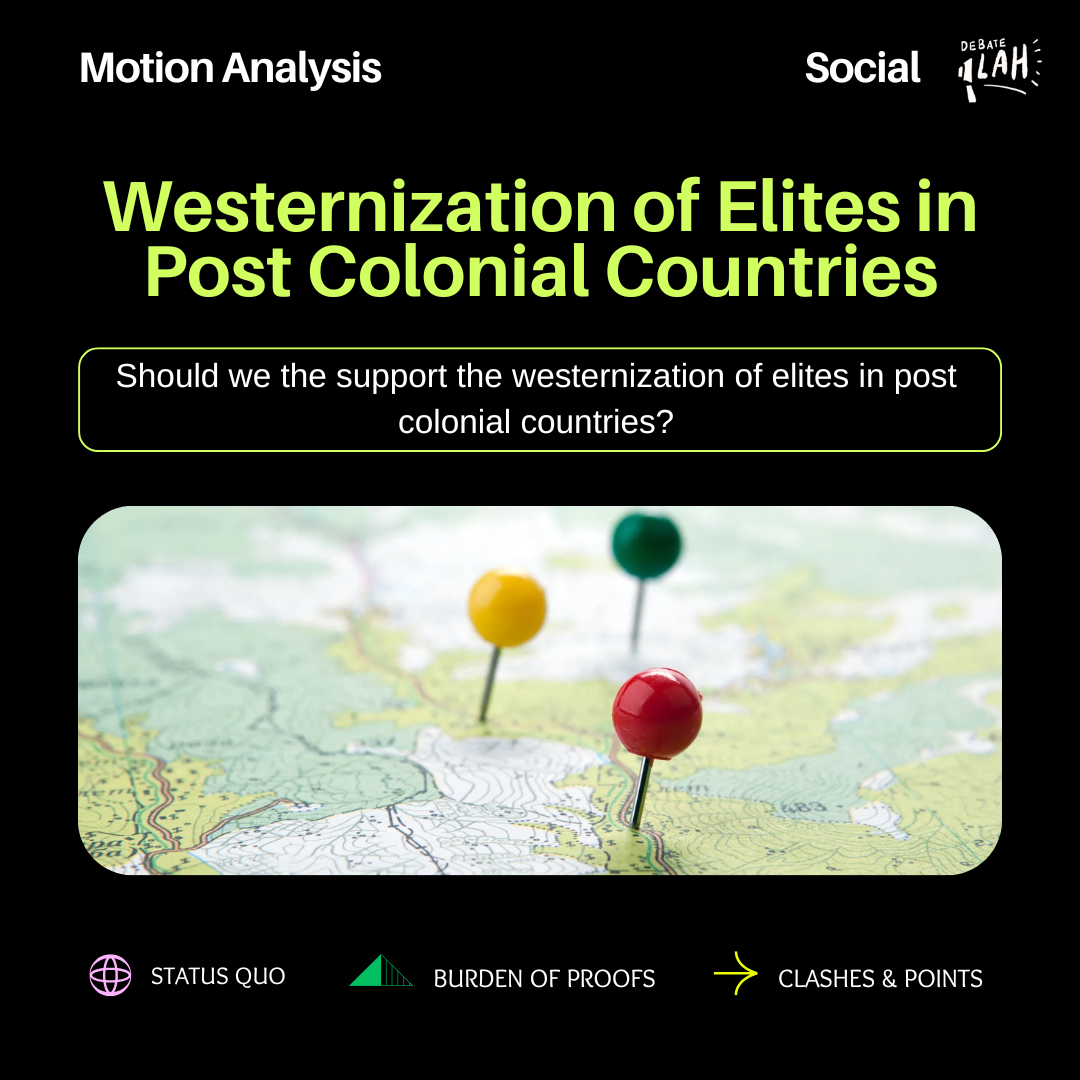When the Influential Get Influenced
Elites – the richest, most powerful, best-educated and best-trained people in society. These are the people who have access to great wealth and resources, and they are also the people who have the power to influence things that happen in our countries. What would happen when these influential individuals from post colonial countries are westernised, given that their countries likely prefer developing and managing the nation to the peoples' own accord rather than remaining in foreign systems?
With this query in mind, we present you the answer through the analysis of the motion:
This house regrets the westernisation of elites in post colonial countries
We've fought hard for independence and autonomy – but what happens when the West's influence remains in the very people who have the power to change current systems in our countries?
Status Quo: A Great Mark on Post Colonial Countries
With systems and lifestyles of the West appealing to the elite, this will pose a great impact towards post colonial countries where they cannot afford brain drain and need the elite to help build up their countries. However, some western systems have undeniably revolutionised post colonial countries for the better, as part of these systems were imposed to improve the comparatively outdated and inefficient methods these countries were running on in the past.
Proponents tell us that the westernisation of elites in post colonial countries is regrettable. They would rather elites from post colonial countries to stay within their countries and keep their wealth and influence there to build up local systems. Also, post colonial nations are nations that are still rebuilding their country and have the incentive to make sure their states are functional.
They say that western institutions aren't the sole ones that work well; they advocate including local institutions that are tailored to the people and their cultures, or in other words, systems are tailored to the multicultural settings of these countries.
Opponents shut down the proposition's comparative of a multiracial society as colonisation of that country likely involved the division of cultures, forming a monoracial society in turn. Then, a dominant ethnicity in these countries now rule the post colonial states. They tell us that when power is concentrated within elites that act only to the benefit of their race and culture, they become the new oppressor of the people and privilege is vested within them.
#1 Westernisation of Post Colonial Systems
Proponents claim that it is principally egregious for elites to abide with systems of western oppression. Colonialism was an oppressive system imposed on ex-colonies where colonising nations divided and conquered the peoples, pillaging their land while erasing the dominance of their culture. On the Opposition side, western ideas are implied as fair and ideal. However, in the present, no compensation mechanism exists for post colonial states when they've been unfairly deceived, exploited and abused. The idolisation of western systems occur at the cost of these elites' own cultures.
Moreover, post colonialist independence is predicated on the idea of having autonomy over oneself and their identity. Opponents on the other hand impose the idea of local cultures being inferior. This manifests in the prevalent narrative that speaking Chinese, for example, is not preferrable to speaking English. Proponents also accuse opponents of devaluing individuals because their values are tethered to western values. Proposition thinks that people should be allowed to take pride in their local culture regardless of western imposition.
Opponents give us more insight on education systems under westernisation. As much as proponents want to advocate for complete unity, gated communities and social inequality still exist, thus citizens of post colonial countries are still disconnected. The multiculturalism that Proposition strives for is hard to achieve as there are dominant languages that minorities may find hard to catch on or rarely speak in their respective communities, driving division due to language barriers. This is worsened by race-based social inequalities that exist in post colonial countries.
With this, they side with western systems due to the undeniable benefits they have brought to these post colonial states. They say that these systems have always been targeted to make education, for instance, accessible in order to form a competent workforce that benefits the country and its economic competitiveness. They also oppose this motion as they claim that there is no way to really counteract with the globalised spread of western systems; therefore, they choose to adapt.
#2 Governance
Proponents argue that the westernation of elites will cause a degradation of development of state institutions. This is because westernisation of elites in the past have entrenched present development. Oftentimes the end goal of developing states end up being to replicate western systems, and this has happened throughout generations time and time again. This brings multiple disadvantages to the post colonial states. Firstly, it harms local education. If the elite are westernised, and in turn influence citizens to be inclined to follow western systems, standards and lifestyles, they will have end goals of leaving the country, so they leave without contributing to the nation. In Proposition, they avoid brain drain because when elites stay and invest into the local system, it gives the education system more benefits through endowments, and there will be more local universities to bridge the wealth gap. Proponents say that opponents are only barring education for the poor when they oppose this motion.
In addition, it affects these nations' political systems. In Opposition, the political systems run in the country never fit the people, and the rich elites in cabinet will never truly understand the common person in a nation. The people's needs are not taken into account, and systems are applied not because they solve problems locals face, but rather due to its effectiveness in foreign settings.
Opponents defend their stance by saying that it enables critique of these nations' governance. In Proposition, any critique of governance of one's country is seen as a critique of their culture. Without western culture, governments can disguise unpreferable governing systems as national cultures. This is proven through the Asian Values Discourse in the 1960s which implied that authoritarianism is an inherently Asian value and that liberal democracy is an inherently western input. Another instance of this is, any critique of the Bharatiya Janata Party in India is interpreted as a critique against Hinduism itself and therefore cracked down upon. Comparatively, when the elite align themselves with positive western systems, governments cannot use these systems to shield their governance as western cultures are seen as foreign and have no connection to the local culture. In Opposition, as most western countries today are strong liberal democracies, they devalue authoritarianism and support equality rather than hegemony.
Burden of Proofs
After reading the reasonings of both sides for supporting and opposing this motion, it's your turn to decide which you agree with more.
Proponents should prove why western superiority is a bad narrative and how western ideals don’t fit into post colonial states. Besides that, they also need to probe why a multicultural narrative is a better alternative.
Opponents should prove why a multicultural alternative is worse and how minorities are more oppressed in that mechanism. They also have to prove how there are western values that can be adopted in post colonial countries.
Do you think that it is bad for elites from post colonial countries to be westernised? Or do you think that this influence ultimately brings benefits to citizens of post colonial countries?
Delving Deeper into the Topic
Here's the complete analysis of the motion, all summarised into one handy document to aid your understanding of the westernisation of elites from post colonial countries.
Deepest appreciations to Team Malaysia and Team Singapore from Macau Online WSDC 2021 for the insightful debate!
Authors: Adam Syahmi (@adamsyahmi_ye), Jacquelyn Hon (@maongdebateclub on Instagram)

